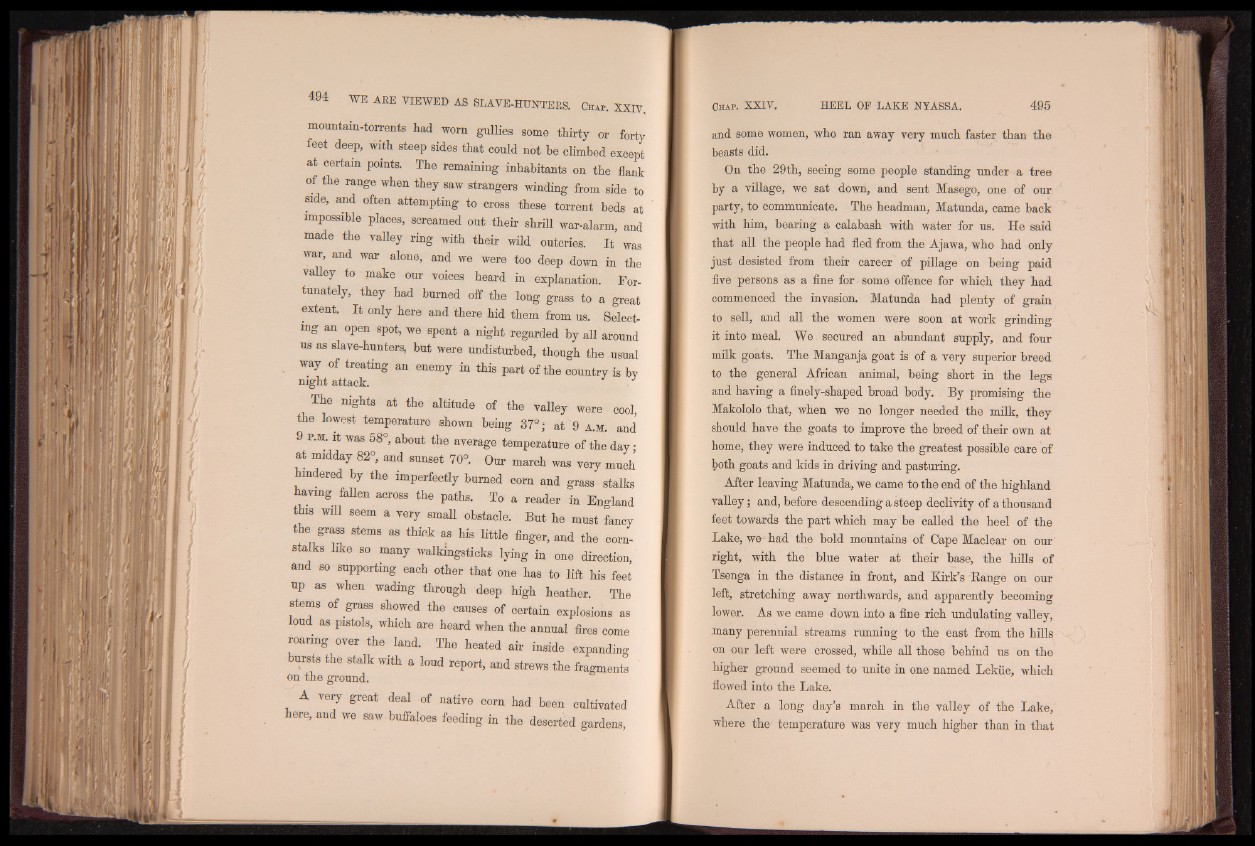
mountain-torrents had worn gullies some thirty or forty
feet deep, with steep sides that could not be climbed except
at certain points. The remaining inhabitants on the flank
of the range when they saw strangers winding from side to
side, and often attempting to cross these torrent beds at
impossible places, screamed out their shrill war-alarm, and
made the valley ring with their wild outcries. I t was
war, and war alone, and we were too deep down in the
valley to make our voices heard in explanation. Fortunately,
they had burned off the long grass to a great
extent. I t only here and there hid them from us. Selecting
an open spot, we spent a night regarded by all around
us as slave-hunters, but were undisturbed, though the usual
way of treating an enemy in this part of the country is bv
night attack.
The nights at the altitude of the valley were cool,
the lowest temperature shown being 3 7 °; at 9 a.m. and
9 p.m. it was 58°, about the average temperature o f the d a y ;
at midday 82°, and sunset 70°. Our march was very much
hindered by the imperfectly burned corn and grass stalks
having fallen across the paths. To a reader in England
this wiU seem a very small obstacle. But he must fancy
the grass stems as thick as his little finger, and the cornstalks
like so many walkingsticks lying in one direction
and so supporting each other that one has to lift his feet
up as when wading through deep high heather. The
stems o f grass showed the causes of certain explosions as
loud as pistols, which are heard when the annual fires come
roaring over the land. The heated air inside expanding
bursts the stalk with a loud report, and strews the fragments
on the ground.
A very great deal of native corn had been cultivated
here, and we saw buffaloes feeding in the deserted gardens,
and some women, who ran away very much faster than the
beasts did.
On the 29th, seeing some people standing under a tree
by a village, we sat down, and sent Masego, one of our
party, to communicate. The headman, Matunda, came back
with him, bearing a calabash with water for us. He said
that all the people had fled from the Ajawa, who had only
just desisted from their career of pillage on being paid
five persons as a fine for some offence for which they had
commenced the invasion. Matunda had plenty of grain
to sell, and all the women were soon at work grinding
it into meal. We secured an abundant supply, and four
milk goats. The Manganja goat is of a very superior breed
to the general African animal, being short in the legs
and having a finely-shaped broad body. By promising the
Makololo that, when we no longer needed the mi Hr they
should have the goats to improve the breed of their own at
home, they were induced to take the greatest possible care of
both goats and kids in driving and pasturing.
After leaving Matunda, we came to the end of the highland
valley; and, before descending a steep declivity of a thousand
feet towards the part which may be called the heel of the
Lake, we had the bold mountains of Cape Maclear on our
right, with the blue water at their base, the hills of
Tsenga in the distance in front, and Kirk’s Bange on our
left, stretching away northwards, and apparently becoming
lower. As we came down into a fine rich undulating valley,
many perennial streams running to the east from the hills
on our left were crossed, while all those behind us on the
higher ground seemed to unite in one named Lekiie, which
flowed into the Lake.
After a long day’s march in the valley of the Lake,
where the temperature was very much higher than in that